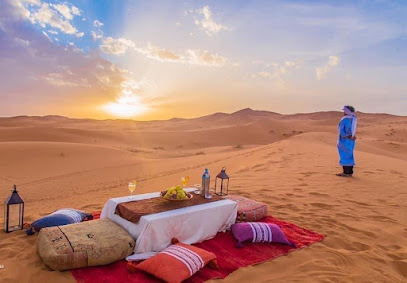
The Majestic Sands of the Sahara Desert
The Sahara Desert in Morocco is one of the most enchanting places on Earth. It offers a unique blend of natural beauty, cultural richness, and thrilling adventures. Stretching over vast expanses, the Sahara's golden dunes and endless horizons create a surreal landscape that captivates every visitor. A trip to the Sahara is not complete without experiencing a camel ride at sunset. As the sky transforms into a palette of orange and pink, the serene beauty of the desert comes alive. Visitors can also opt for 4x4 tours that take them deep into the heart of the desert, unveiling its hidden oases and ancient Berber villages. The night sky in the Sahara is a spectacle in itself. Far from city lights, the desert offers one of the clearest views of the Milky Way. Stargazing here is an unforgettable experience, with the stars so bright and close that they seem almost within reach. Staying in a traditional nomadic camp adds to the authenticity of the Sahara experience. These camps provide a glimpse into the life of the Berbers, the indigenous people of the region. Visitors can enjoy traditional Moroccan cuisine, music, and dance, all while surrounded by the tranquility of the desert.
Local tips in Sahara Desert
- Pack light but include essentials like sunscreen, sunglasses, and a hat to protect against the sun.
- Wear loose, comfortable clothing suitable for both hot days and cool nights.
- Plan your visit from October to April for the most pleasant weather conditions.
- Bring a good camera to capture the stunning landscapes and night skies.
- Stay hydrated by drinking plenty of water throughout your journey.
The Majestic Sands of the Sahara Desert
The Sahara Desert in Morocco is one of the most enchanting places on Earth. It offers a unique blend of natural beauty, cultural richness, and thrilling adventures. Stretching over vast expanses, the Sahara's golden dunes and endless horizons create a surreal landscape that captivates every visitor. A trip to the Sahara is not complete without experiencing a camel ride at sunset. As the sky transforms into a palette of orange and pink, the serene beauty of the desert comes alive. Visitors can also opt for 4x4 tours that take them deep into the heart of the desert, unveiling its hidden oases and ancient Berber villages. The night sky in the Sahara is a spectacle in itself. Far from city lights, the desert offers one of the clearest views of the Milky Way. Stargazing here is an unforgettable experience, with the stars so bright and close that they seem almost within reach. Staying in a traditional nomadic camp adds to the authenticity of the Sahara experience. These camps provide a glimpse into the life of the Berbers, the indigenous people of the region. Visitors can enjoy traditional Moroccan cuisine, music, and dance, all while surrounded by the tranquility of the desert.
When is the best time to go to Sahara Desert?
Iconic landmarks you can’t miss
Jardin Majorelle
Explore the vibrant beauty and cultural richness of Jardin Majorelle, a botanical paradise in the heart of Marrakech, Morocco.
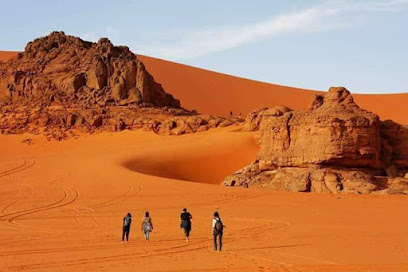
Jemaa el-Fnaa
Experience the vibrant culture of Marrakesh at Jemaa el-Fnaa, a UNESCO World Heritage site filled with food, entertainment, and local flavor.
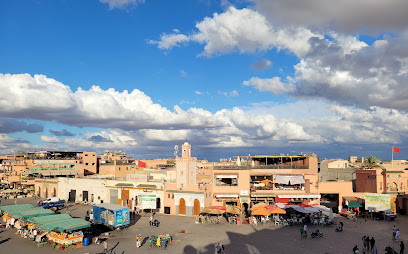
Bahia Palace
Explore the exquisite Bahia Palace in Marrakesh, a stunning historical landmark showcasing Moroccan architectural beauty and rich cultural heritage.
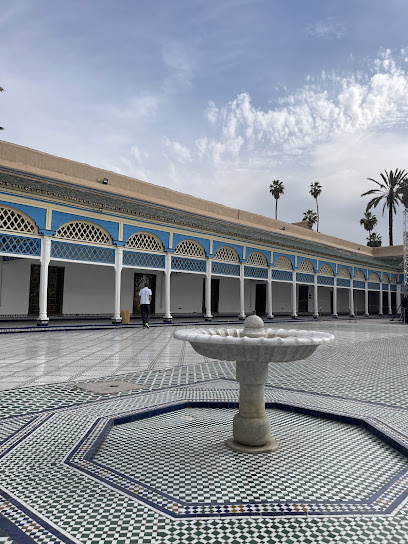
Saadian Tombs
Explore the Saadian Tombs in Marrakesh, a breathtaking historical landmark showcasing exquisite architecture and rich royal history.

Iminifri Natural Bridge
Experience the breathtaking beauty of Iminifri Natural Bridge, a stunning natural wonder in Demnat, Morocco, perfect for nature lovers and adventurers alike.
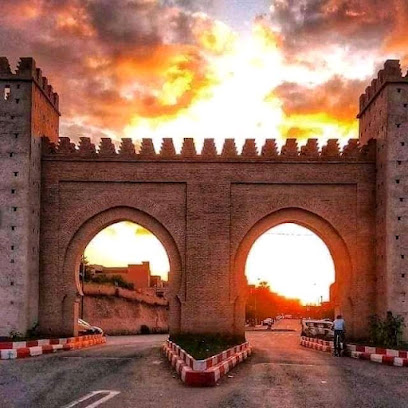
Kasbah Ait Ben Haddou
Explore the UNESCO World Heritage site of Kasbah Ait Ben Haddou, a timeless marvel of Moroccan architecture and a cinematic treasure waiting to be discovered.
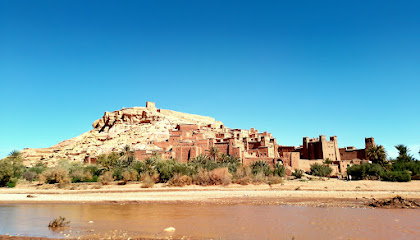
Marrakech Desert Tours
Discover the enchanting Sahara Desert with Marrakech Desert Tours, offering unforgettable adventures and cultural experiences in Morocco's captivating landscapes.
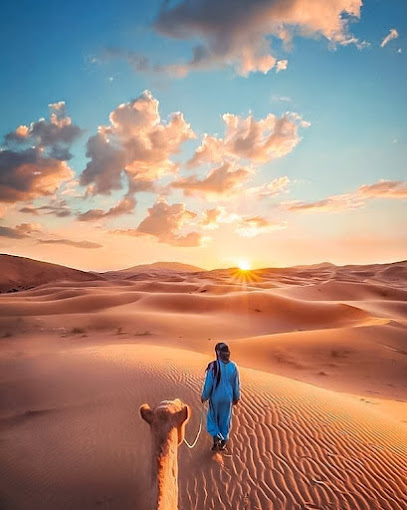
Tizi n'Tichka panoramic views
Experience the stunning panoramic views of Tizi n'Tichka, a must-visit rest stop between Marrakech and the Sahara, showcasing Morocco's natural beauty.
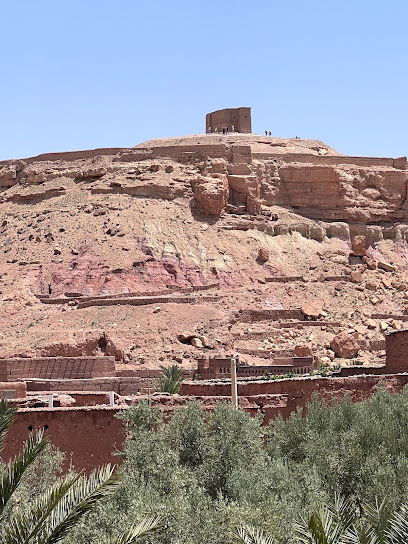
Desert Majesty
Discover the thrill of the Sahara with Desert Majesty, your premier tour operator for luxurious glamping and unforgettable desert adventures in Ouarzazate.
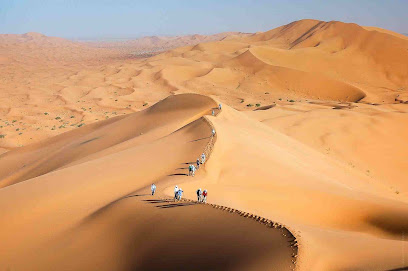
Morocco Desert Camps & Desert Tours
Discover the wonder of the Sahara at Morocco Desert Camps & Tours, where adventure and tranquility meet in the heart of the desert.
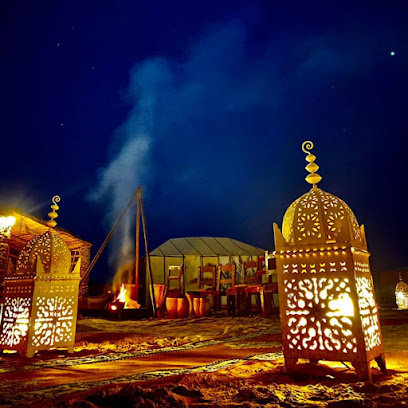
Merzouga Dunes
Explore the stunning Merzouga Dunes in the Sahara Desert, where adventure meets the rich culture of the Berber nomads amidst breathtaking landscapes.
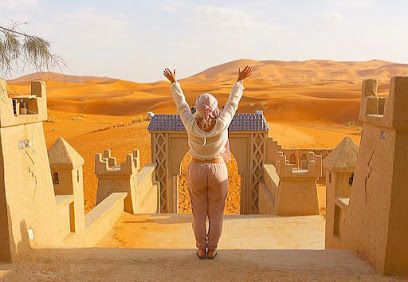
Sahara Desert Morocco
Discover the breathtaking Sahara Desert in Morocco, an adventure-filled oasis of stunning dunes, rich culture, and unforgettable experiences.
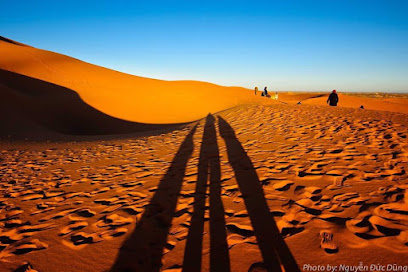
Morocco Sahara Desert Travel
Explore the stunning landscapes and rich culture of the Morocco Sahara Desert, a magical destination filled with adventure and serenity.
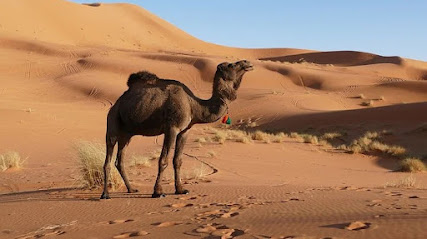
Authentic Sahara Tours
Discover the magic of the Sahara Desert with Authentic Sahara Tours - adventure, culture, and breathtaking landscapes await you in Morocco's majestic sands.
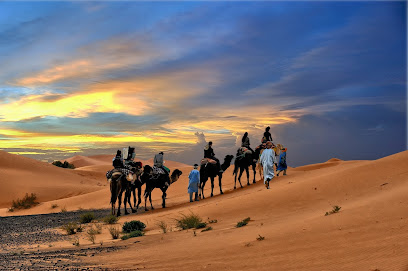
Top Desert Morocco Tours
Explore the enchanting landscapes and rich culture of Morocco with Top Desert Morocco Tours for an unforgettable adventure.
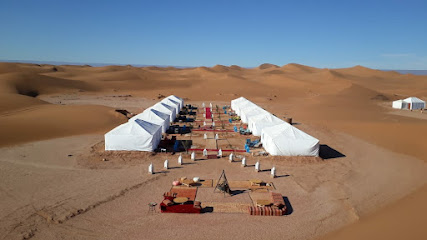
Unmissable attractions to see
Moroccan Activities Company
Explore the stunning dunes of Merzouga, immerse yourself in Berber culture, and experience the magic of Morocco's Sahara Desert.
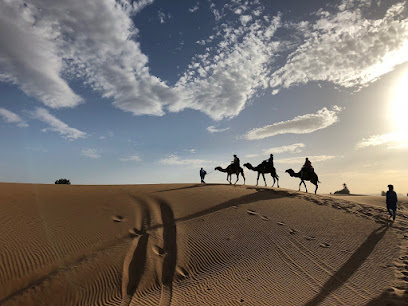
Caravane du Grand Erg
Explore the Sahara Desert with Caravane du Grand Erg – your gateway to unforgettable adventure and cultural experiences in Zagora, Morocco.
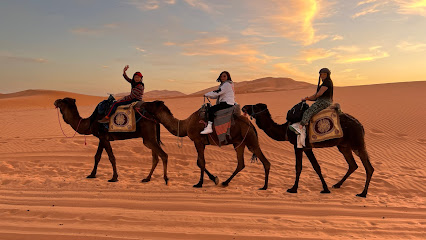
Sahara Buggy
Embark on a thrilling adventure through the mesmerizing landscapes of the Sahara Desert with Sahara Buggy, a top tourist attraction in Morocco.
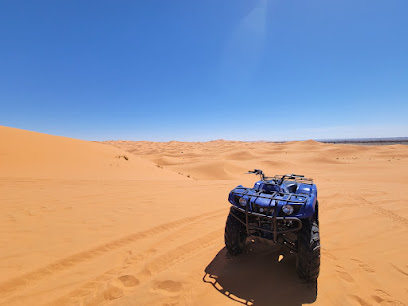
Desert Tour In Morocco
Discover the enchanting Moroccan desert with personalized tours that blend adventure, culture, and breathtaking landscapes.
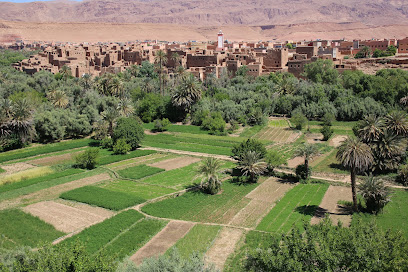
Original Morocco Tours | Sahara Desert Trip & Camel Trekking
Discover the Sahara Desert's beauty with Original Morocco Tours, offering camel trekking and personalized adventures for all ages in Morocco.
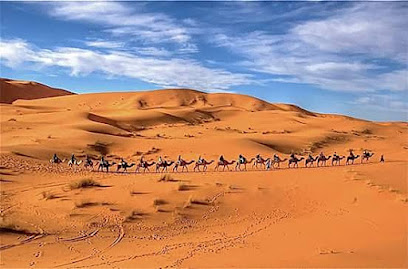
Sahara
Explore the enchanting Sahara Desert in Morocco, a wonderland of golden dunes, rich Berber culture, and unforgettable adventures under the stars.
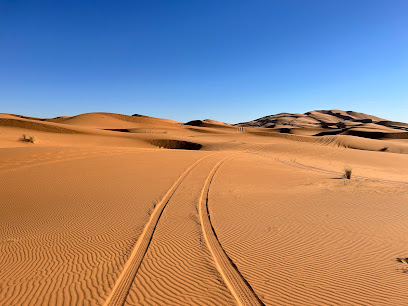
Safari Morocco
Discover the mesmerizing landscapes and rich culture of Morocco at Safari Morocco, a top tourist attraction in Marrakesh.
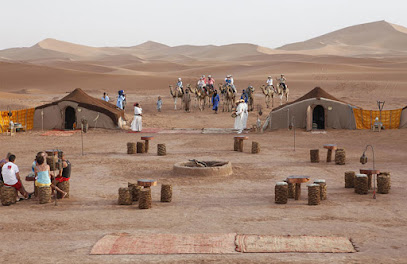
Sahara Camel Tours Company
Explore the majestic Sahara Desert with Sahara Camel Tours, offering unforgettable camel treks, stunning sunsets, and authentic Berber experiences in Morocco.
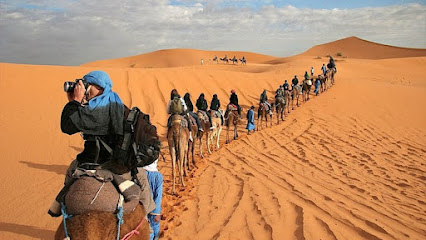
Berber Nomadic expedition
Dive into the enchanting Berber culture and experience the breathtaking beauty of the Sahara with the Berber Nomadic Expedition in Merzouga, Morocco.
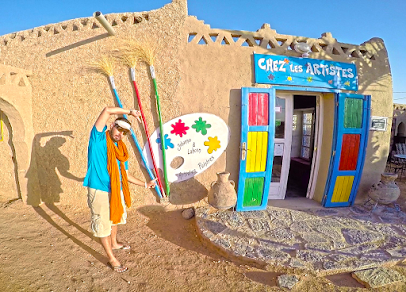
Mhamid el ghizlane desert
Explore the breathtaking Mhamid El Ghizlane Desert - a gateway to the Sahara filled with rich culture, stunning landscapes, and unforgettable experiences.
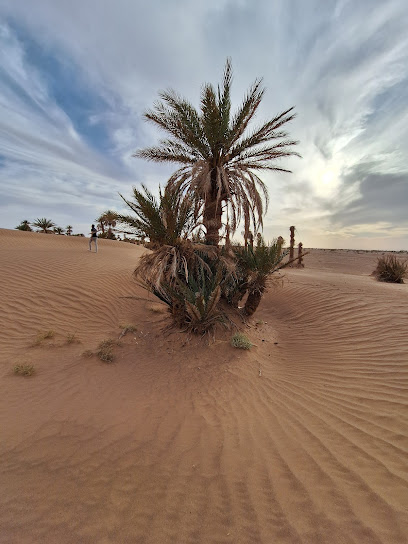
Sahara Desert tour
Explore the magic of the Sahara Desert with unforgettable tours through majestic dunes, Berber villages, and breathtaking landscapes in Merzouga.
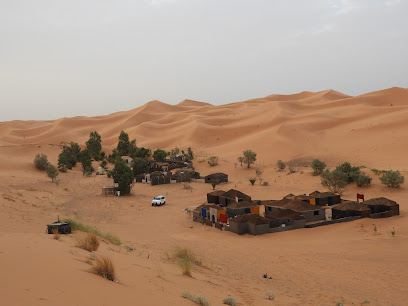
Tours Across Morocco camel-trekking camp
Discover the enchanting Sahara Desert at Tours Across Morocco Camel-Trekking Camp, where adventure meets authentic Berber culture.
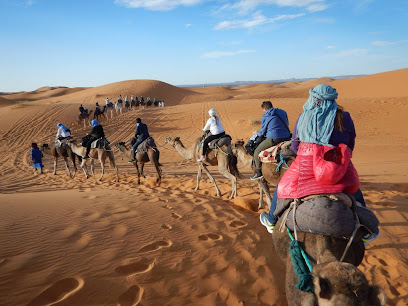
Get_your_tour_guid_in_ouzina_desert
Experience the serene beauty and rich culture of the Ouzina Desert, a mesmerizing destination in Morocco perfect for adventure and relaxation.
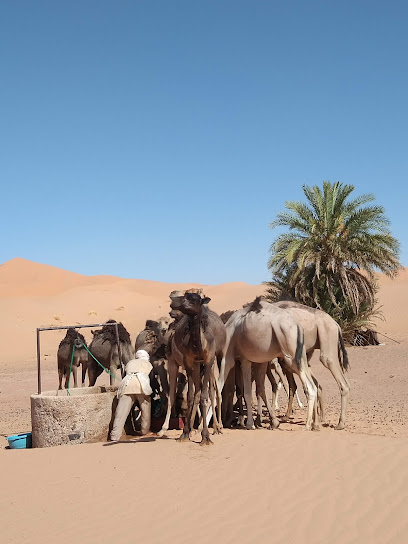
Sahara Desert Camping - Morocco - Erg Chebbi - Merzouga
Discover the mesmerizing Sahara Desert Camping at Erg Chebbi, offering an unforgettable escape surrounded by breathtaking sand dunes and starry nights.
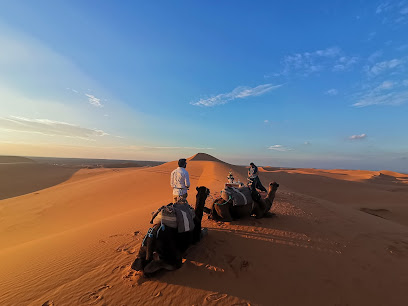
Morocco explore
Experience the magic of the Sahara Desert with Morocco Explore - your trusted guide to camel treks, starry nights, and cultural adventures.
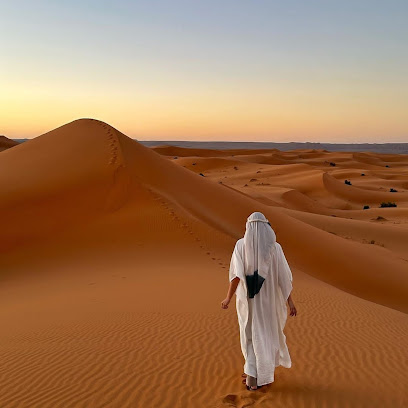
Essential places to dine
Dar Essalam
Experience authentic Moroccan flavors at Dar Essalam, where culinary tradition meets fine dining in the heart of Marrakech.
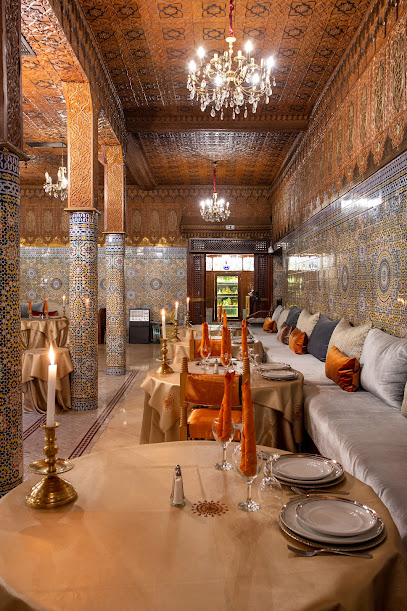
L'mida Marrakech
Experience authentic Moroccan cuisine at L'mida Marrakech - where tradition meets modern culinary art in the heart of Medina.
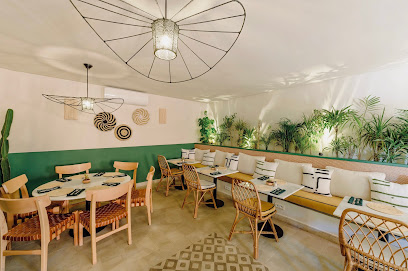
Dar Cherifa
Discover authentic Moroccan flavors at Dar Cherifa - a culinary haven in Marrakech's historic Medina.
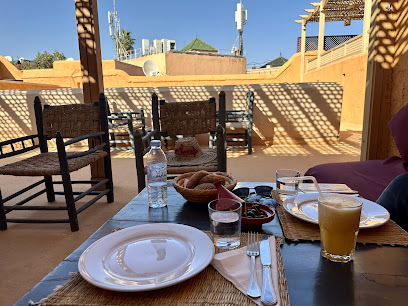
La Grande Table Marocaine
Experience authentic Moroccan cuisine at La Grande Table Marocaine within Hôtel Royal Mansour, where luxury meets tradition in every bite.
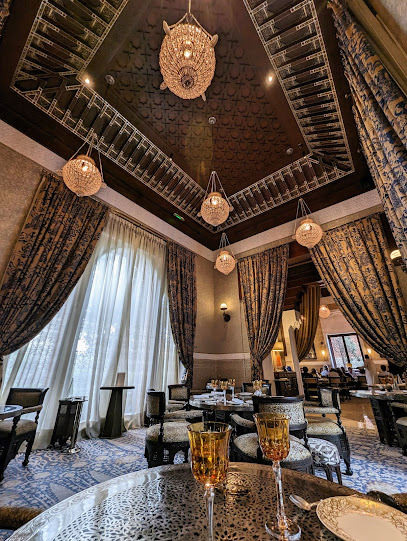
BOHEME AGAFAY DESERT
Experience luxury dining and thrilling outdoor adventures in the breathtaking Agafay Desert near Marrakech.
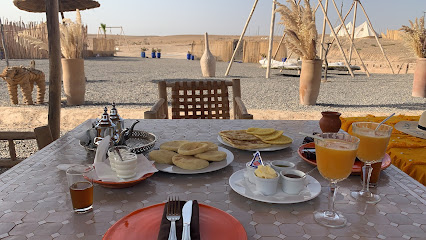
Resturant Nora
Discover authentic Moroccan flavors at Restaurant Nora in Khamlia, where traditional dishes meet the breathtaking beauty of the Sahara Desert.
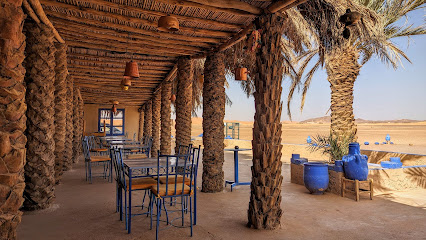
Dar Yacout
Discover the exquisite flavors and captivating ambiance at Dar Yacout, where authentic Moroccan cuisine meets enchanting hospitality.
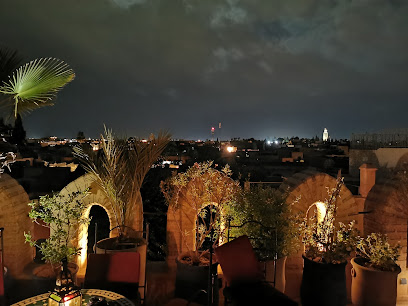
Touroug Cafe
Experience authentic Moroccan cuisine at Touroug Cafe - where every meal tells a story.
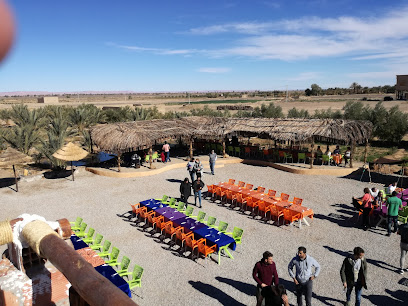
sahara marocain
Experience authentic Moroccan flavors at Sahara Marocain – a delightful restaurant in the heart of Marrakesh offering traditional dishes and warm hospitality.
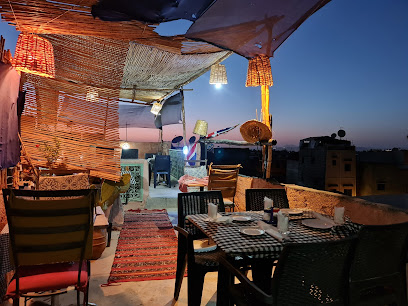
Lune de Desert
Experience authentic Moroccan flavors at Lune de Desert in Errachidia – a culinary oasis near the Sahara.
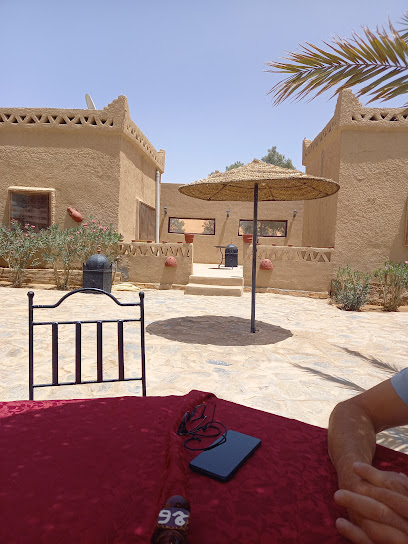
Les Terrasses Des Arts Marrakech
Experience exquisite Moroccan and European cuisine at Les Terrasses Des Arts - where culinary tradition meets stunning views in Marrakech.
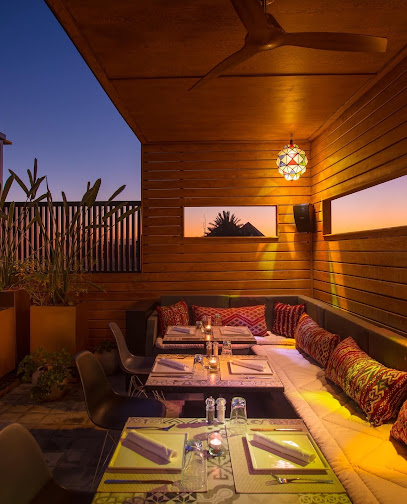
CAFE RESTAURANT TENERE
Discover the essence of Moroccan cuisine at Cafe Restaurant Tenere in Merzouga – where every dish tells a story.
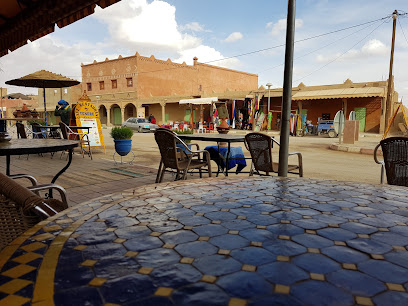
Café Restaurant SAHARA
Experience authentic Moroccan cuisine at Café Restaurant SAHARA in Sidi Mokhtar - where every meal tells a story.
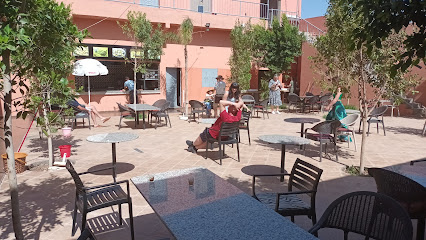
Jad Jamal
Savor authentic Moroccan flavors in the heart of Marrakesh at Jad Jamal—a cozy café offering traditional dishes in a vibrant setting.
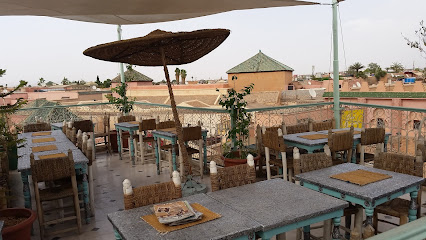
La dune agafay
Discover culinary delights at La Dune Agafay amidst breathtaking desert views, blending Moroccan flavors with serene landscapes.
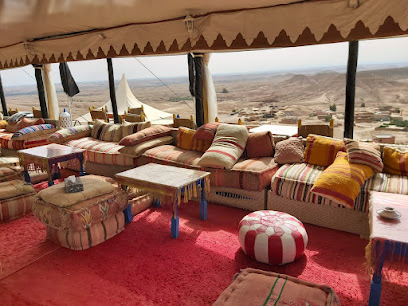
Markets, malls and hidden boutiques
Ensemble Artisanal
Discover the vibrant craftsmanship of Morocco at Ensemble Artisanal, a must-visit destination for unique handmade treasures in the heart of Marrakech.
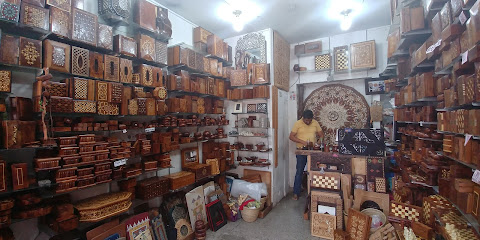
Sahara Mall
Discover Sahara Mall in Inezgane: a vibrant shopping haven with diverse stores, delicious dining, and family-friendly entertainment.
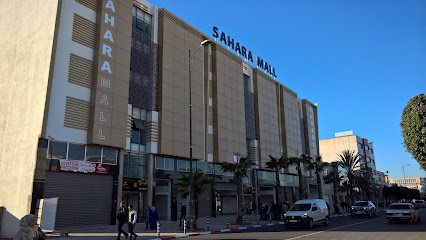
Dépôt Nomade
Discover authentic Moroccan crafts and culture at Dépôt Nomade, a vibrant shopping hub in Hassilabied offering unique souvenirs and local flavors.
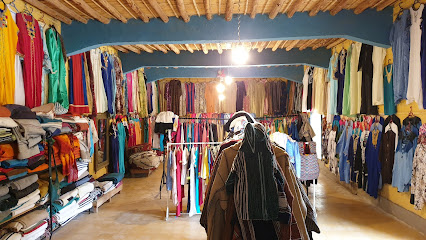
Max & Jan Medina
Discover the colorful blend of tradition and modernity at Max & Jan Medina, where unique Moroccan fashion awaits every traveler.
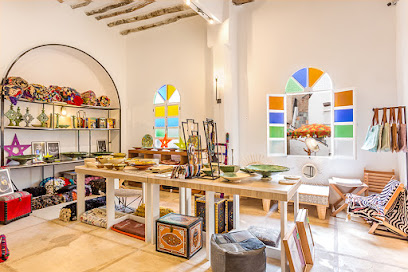
Sahara Desert Luxury Camp
Discover the enchanting Sahara Desert Luxury Camp in Merzouga, where luxurious comfort meets adventure in the heart of the Sahara.

labyrinthe de sud
Discover the Labyrinthe de Sud, where each antique tells a story, and history comes alive in the heart of Tarmigt.
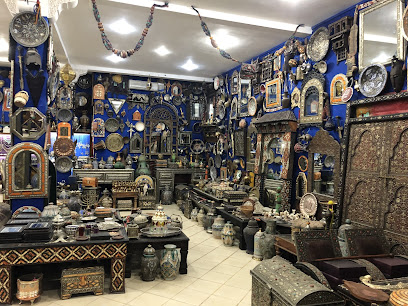
Sahara ATV Quad experience
Discover the thrill of the Sahara Desert with ATV adventures, stunning landscapes, and family-friendly fun in Merzouga.
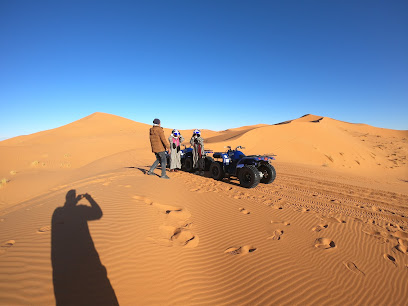
Sahara Desert Morocco
Experience the breathtaking beauty and adventure of the Sahara Desert in Morocco, a must-visit destination for every traveler seeking unique landscapes.
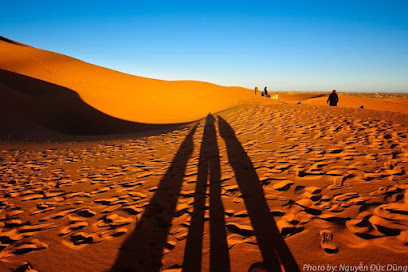
Desert Backpackers hostel
Discover the enchanting Sahara Desert from the comfort of Desert Backpackers Hostel in Merzouga, your ultimate desert adventure base.
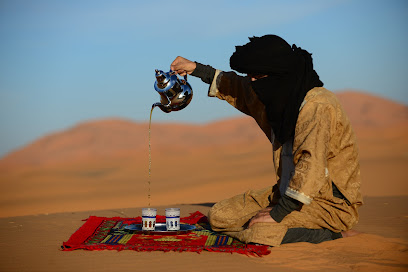
Souvenir Of Sahara
Discover the vibrant charm of Souvenir Of Sahara, a must-visit bazaar in Ksar Touroug for authentic Moroccan crafts and unforgettable souvenirs.
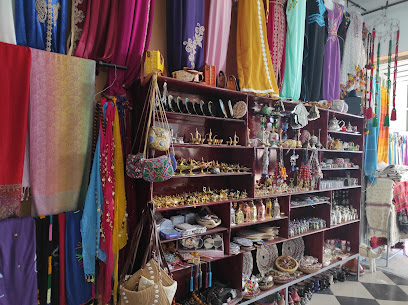
Herbier kounouz sahara
Discover authentic Moroccan handicrafts and unique souvenirs at Herbier Kounouz Sahara, your destination for local treasures in Merzouga.
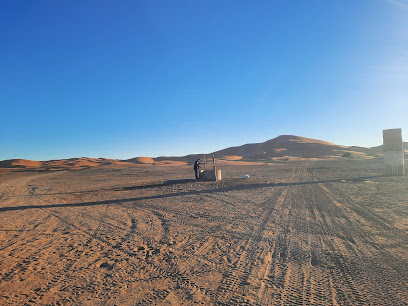
Sahara Desert tour
Immerse yourself in the enchanting beauty and culture of the Sahara Desert with unforgettable tours from Merzouga, perfect for every adventurous traveler.
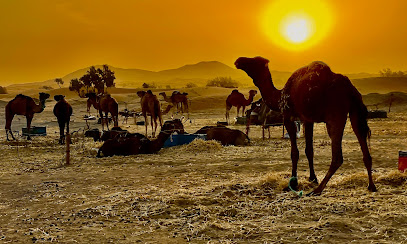
Souvenirs Shop
Explore the vibrant Souvenirs Shop in Hassilabied - a treasure trove of Moroccan crafts and cultural experiences awaiting every traveler.
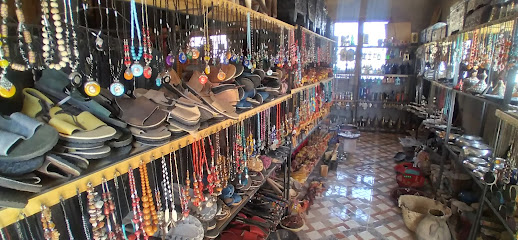
La Maison Du Sud
Explore the exquisite jewelry of La Maison Du Sud in Sijilmassa, where Moroccan craftsmanship meets vibrant culture.
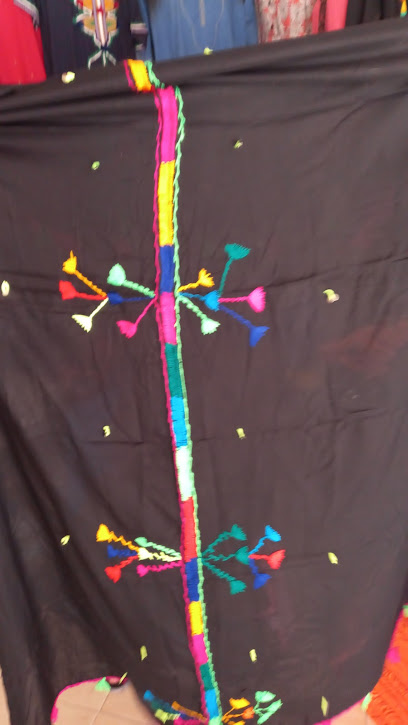
Sahara shop Marrakech
Explore Sahara Shop Marrakech for unique handcrafted jewelry that embodies Moroccan artistry and culture, perfect for every traveler.

Local Phrases about Sahara Desert
-
- HelloSalam
[sa-laam] - GoodbyeMa'a salama
[ma-a sa-la-ma] - YesNaam
[na-am] - NoLa
[la] - Please/You're welcomeMin fadlik
[min fa-dlik] - Thank youShukran
[shuk-ran] - Excuse me/SorrySamahani
[sa-ma-ha-ni] - How are you?Labas?
[la-bas] - Fine. And you?Zwin. O ntuma?
[zwin. o ntu-ma] - Do you speak English?Katkalm al ingliziya?
[kat-kalm al in-gli-zi-ya] - I don't understandMa fhmtsh
[ma fhm-tsh]
- HelloSalam
-
- I'd like to see the menu, pleaseBghit nchuf lqima, min fadlik
[b-ghit n-chuf l-ki-ma, min fa-dlik] - I don't eat meatMa koulsh lhout
[ma koul-sh l-hout] - Cheers!Bsahtek
[b-sah-tek] - I would like to pay, pleaseBghit ndfa', min fadlik
[b-ghit ndfa', min fa-dlik]
- I'd like to see the menu, pleaseBghit nchuf lqima, min fadlik
-
- Help!3awni!
[3a-w-ni] - Go away!3la rasi!
[3-la ra-si] - Call the Police!D3i lbulis!
[d-3i l-bu-lis] - Call a doctor!D3i tabib!
[d-3i ta-bib] - I'm lostGhaltt
[ghal-tt] - I'm illAna mrid
[a-na m-ri-d]
- Help!3awni!
-
- I'd like to buy...Bghit nshri...
[b-ghit n-shri] - I'm just lookingAna kaynchuf
[a-na kayn-chuf] - How much is it?Sh7al kayn?
[sh-hal kayn] - That's too expensiveHadshi gha 7ssan
[had-shi gha 7s-san] - Can you lower the price?Katdiri t9assmi?
[kat-di-ri t-qa-s-smi]
- I'd like to buy...Bghit nshri...
-
- What time is it?Sh7al f wakt?
[sh-hal f wakt] - It's one o'clockS3a wahda
[sa-a wah-da] - Half past (10)Nus l3achra
[nus l-a-chra] - MorningSbah
[s-bah] - AfternoonDhor
[d-hor] - Evening3sha
[3-sha] - Yesterday3er9
[3-er9] - TodayLyawm
[l-yawm] - TomorrowGhadwa
[gha-dwa] - 1Wa7ed
[wa7-ed] - 2Juj
[juj] - 3Tlata
[tla-ta] - 4Rb3a
[rb-a] - 5Khamsa
[kham-sa] - 6Setta
[set-ta] - 7Sab3a
[sab-a] - 8Tmnya
[tmn-ya] - 9T3issa
[t-3is-sa] - 103achra
[a-chra]
- What time is it?Sh7al f wakt?
-
- Where's a/the...?Feen l...
[fee-n l] - What's the address?Sh7al l3nwan?
[sh-hal l-a-n-wan] - Can you show me (on the map)?Katdiri t3ani (3la lkhariita)?
[kat-di-ri t-3a-ni (3-la l-ka-rii-ta)] - When's the next (bus)?Kamlin m3a?
[kam-lin m-a] - A ticket (to ....)Takat (la ...)
[ta-kat (la)]
- Where's a/the...?Feen l...
History of Sahara Desert
-
The Sahara Desert in Morocco has a rich history as a vital trade route. From as early as the 8th century, trans-Saharan caravans transported gold, salt, and other goods between sub-Saharan Africa and the Mediterranean. These routes fostered cultural and economic exchanges that shaped the history of the region.
-
In the 11th century, the Almoravid Dynasty arose from the Saharan Berber tribes. They established a vast empire that included present-day Morocco and parts of Spain. The Almoravids played a crucial role in spreading Islam and fostering architectural and cultural advancements in the region.
-
In 1591, the Battle of Tondibi marked a significant event in the Sahara Desert's history. The Moroccan Saadi dynasty, led by Sultan Ahmad al-Mansur, invaded the Songhai Empire. This battle resulted in the decline of the Songhai Empire and expanded Moroccan influence into the Sahara.
-
The Tuareg people, often referred to as the 'Blue People' due to their indigo-dyed clothes, have long inhabited the Sahara Desert. These nomadic Berbers have a unique culture and social structure, and their mastery of desert survival has been essential for centuries. They continue to influence the cultural landscape of the Sahara in Morocco.
-
During the late 19th and early 20th centuries, the Sahara Desert in Morocco came under French colonial rule. The French established military posts and sought to control the trans-Saharan trade routes. This era significantly impacted the local cultures and economies, leading to a blend of French and indigenous influences.
-
Morocco gained independence from French colonial rule in 1956. Since then, the Sahara Desert region has seen various development initiatives aimed at improving infrastructure and living conditions. However, the nomadic lifestyle and traditional practices continue to be an integral part of the region's identity.
Sahara Desert Essentials
-
The Sahara Desert in Morocco is most commonly accessed from the city of Marrakesh. The nearest international airport is Marrakesh Menara Airport (RAK). From Marrakesh, you can join a guided tour or rent a car to reach the desert. The journey typically involves a drive through the Atlas Mountains, which can take around 8 to 10 hours depending on your destination within the desert. Alternatively, you can take a domestic flight to Errachidia or Ouarzazate and then arrange for a transfer to the desert.
-
Once in the Sahara Desert, most travelers rely on organized tours that provide 4x4 vehicles, camels, or quad bikes for transportation. These tours often include experienced guides who are familiar with the terrain. If you prefer independent travel, renting a 4x4 vehicle is recommended due to the challenging desert conditions. Public transport options are limited in the desert areas, so private transfers or guided tours are the most reliable means of transportation.
-
The official currency of Morocco is the Moroccan Dirham (MAD). Credit cards are accepted in larger hotels and some tourist shops, but cash is essential for most transactions, especially in remote desert areas. ATMs are available in major cities like Marrakesh, but it is advisable to withdraw sufficient cash before heading into the desert. Currency exchange services are available at airports and in city centers.
-
The Sahara Desert in Morocco is generally safe for tourists, especially when traveling with reputable tour operators. However, it is important to take standard precautions. Avoid wandering alone, especially at night, and keep your valuables secure. While there are no specific high-crime areas targeting tourists in the desert, it is always best to stay vigilant and aware of your surroundings. In cities like Marrakesh, be cautious of pickpockets in crowded areas and scams targeting tourists.
-
In case of emergency, dial 19 for police assistance or 15 for medical emergencies. It is recommended to have travel insurance that covers medical emergencies and evacuation. Most desert tours include guides who are trained in first aid and can assist in emergencies. For minor health issues, carry a basic first aid kit and any necessary medications. The nearest medical facilities are located in towns like Merzouga or Zagora, but more comprehensive medical services are available in larger cities like Marrakesh.
-
Fashion: Do dress modestly, especially in rural and conservative areas. Lightweight, breathable clothing is recommended to protect against the sun and sand. Religion: Do respect local customs and traditions. Avoid public displays of affection and be mindful of prayer times. Public Transport: Do be respectful and patient when using local transport. Greetings: Do greet people with a friendly 'Salam Alaikum' (peace be upon you). Eating & Drinking: Do try local dishes and accept food offerings graciously. Don't drink tap water; always use bottled water.
-
To experience the Sahara Desert like a local, consider staying in a traditional Berber camp. Engage with local guides and learn about their way of life. Visit local markets in towns like Rissani to buy fresh produce and traditional crafts. Don't miss the opportunity to watch the sunrise or sunset over the dunes, as it offers a breathtaking view. For a unique experience, take a camel trek into the desert and spend a night under the stars.
Trending Landmarks in Sahara Desert
-
Jardin Majorelle
-
Jemaa el-Fnaa
-
Bahia Palace
-
Saadian Tombs
-
Iminifri Natural Bridge
-
Kasbah Ait Ben Haddou
-
Marrakech Desert Tours
-
Tizi n'Tichka panoramic views
-
Desert Majesty
-
Morocco Desert Camps & Desert Tours
-
Merzouga Dunes
-
Sahara Desert Morocco
-
Morocco Sahara Desert Travel
-
Authentic Sahara Tours
-
Top Desert Morocco Tours
Nearby Cities to Sahara Desert
-
Things To Do in Meknes
-
Things To Do in Marrakech
-
Things To Do in Casablanca
-
Things To Do in Oujda
-
Things To Do in Chefchaouen
-
Things To Do in Taroudant
-
Things To Do in Tlemcen
-
Things To Do in Tetouan
-
Things To Do in Asilah
-
Things To Do in Agadir
-
Things To Do in Tangier
-
Things To Do in Essaouira
-
Things To Do in Europa Point
-
Things To Do in Gorham's Cave Complex
-
Things To Do in St. Michael's Cave











